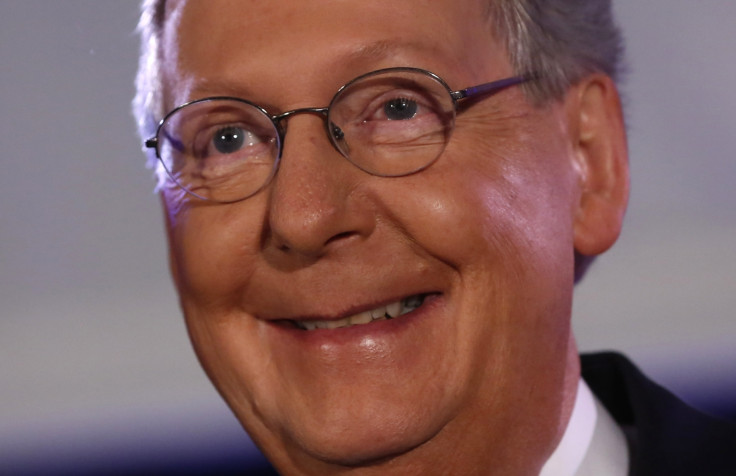US Midterm Elections: Mitch McConnell's Remarkable Journey in Washington's House of Cards

The man poised to become the next majority leader for the US Senate, after 30 years of uninterrupted service, is a disciplined but brutal tactician who has scaled the ranks of the Republican party to fulfil his decade-long dream to lead the upper house of Congress.
Often portrayed as a remote obstructionist in Washington politics, Mitch McConnell, 72, led a remarkable journey from being a polio-crippled boy to becoming America's second most powerful politician.
His first words after the sixth-term victory in Kentucky, where he's never lost an election, were of a conciliatory tone, seemingly burying the hatchet of partisanship with an increasingly beat president Obama: "Just because we have a two-party system doesn't mean we have to be in perpetual conflict," he said.
But those who know him well may guess at the pragmatist touch that saw McConnell equally reviled by liberals, for his obstructionist stance, and the conservative wing of the GOP for being willing to compromise. The strategist behind the victory in 2010 of Republicans in the Congress was in total opposition to Obama's policies.
Rallying for civil rights
GOP lawmakers went on an all-out war on Obama's individual health-care mandate, financial regulations and environmental curbs such as the cap-and-trade approach to carbon regulation. However, McConnell also played key role in bolstering bipartisan deals with Vice President Joe Biden on President George W. Bush's tax cuts in 2010, the debt-ceiling row in 2010 (with risk of federal default) and the fiscal cliff in 2013.
That should not come as a surprise in a man who despised Obamacare's "free healthcare" for everybody but backed government-funded programs in Kentucky.
A serious, disciplined figure, McConnell has been minority leader since 2007, but started his ascent to Washington powerhouse in 1964, as a summer intern for Kentucky Senator John Sherman Cooper, a liberal Republican.
That same year, he marched with Dr Martin Luther King Jr's in the US capital and rallied for civil rights on campus. He assisted at the historic signing of 1965 Civil Rights Act by president Lyndon Johnson.
During Watergate, he campaigned for finance reform. He worked as an aide on Capitol Hill and as deputy assistant attorney general to President Gerald R. Ford, who he backed in his 1976 GOP presidential nomination over Ronald Reagan.
McConnell was elected to the Senate in 1984, ousting Democrat Walter Huddleston. He attributes his stiff attitudes to his mother, who aided him with physical therapy several times a day for two years after he contracted polio at only two.
"This example of incredible discipline that she was teaching me during this period I always felt had an impact on the rest of my life," he said in 2005.
Winking at the Tea Party
To many, McConnell's political journey from a pro-union moderate position to more right-wing, intransigent attitude exemplifies the GOP's shift to the right.
"Many on the left and right alike suspect that, beyond winning at any cost, he has no firm convictions of his own," says Molly Ball. "His defenders say he is simply a pragmatist."
Just because we have a two-party system doesn't mean we have to be in perpetual conflict
A clear example of his pragmatism is his handling of Tea Party members, who wanted to replace the seasoned Washington politician with a catchy businessman, Matt Bevin, capable of dragging support from the radical base.
McConnell hired senior campaign staffers from Senator Rand Paul, his tea-party-backed GOP colleague from Kentucky, to counter-attack Bevin's charisma, and won the Republican primary in May. After his re-election campaign began, he started backing the younger Paul voting his bills and handing him assignments in the Senate.
Paul was the first to congratulate McConnell.
"Tonight, Kentucky makes it perfectly clear: Mr. President, the war on Kentucky coal must end," Paul said.
Obama is advised.
© Copyright IBTimes 2024. All rights reserved.







